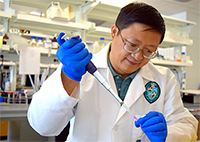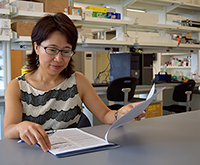The research facilities within the Department of Structural and Cellular Biology include a confocal microscopy suite, an electron microscope, cell and molecular biology laboratories, neuroanatomical and neurophysiological laboratories. In addition, the associated facilities of the Tulane Regional Primate Center are available, as are those of the School of Public Health and Tropical Medicine.
Additionally, the Department maintains the IVIS-XRMS Preclinical small animal imaging core facility under the direction of Dr. Murali Anbalagan.
Please also see the Circadian Cancer Biology Group website for additional information.
 Dr. Zongbing You, Associate Professor and Vice Chair for Research in the Department of Structural and Cellular Biology, investigates how inflammation helps the formation and growth of prostate cancer. There are about 280,000 new prostate cancer patients in the US each year and about 30,000 men die of prostate cancer annually. Yet, what causes prostate cancer is still not very clear. Inflammation (such as prostatitis) is common in men and inflammation is always found in the prostate tumors. Dr. You's team (including six postdocs and one PhD student) found that an inflammatory factor (called interleukin-17) produced by immune cells might be responsible for formation and growth of prostate cancer. They blocked the action of interleukin-17 in mice that spontaneously developed prostate cancer due to a gene mutation and discovered that the mice developed fewer invasive prostate cancers. Their findings suggest that targeting interleukin-17 may be a promising new way to prevent and treat prostate cancer. Dr. You's research has been funded by the Centers of Biomedical Research Excellence (COBRE) grant awarded to Dr. Prescott Deininger and a recent NIH/NCI R01 grant to Dr. You.
Dr. Zongbing You, Associate Professor and Vice Chair for Research in the Department of Structural and Cellular Biology, investigates how inflammation helps the formation and growth of prostate cancer. There are about 280,000 new prostate cancer patients in the US each year and about 30,000 men die of prostate cancer annually. Yet, what causes prostate cancer is still not very clear. Inflammation (such as prostatitis) is common in men and inflammation is always found in the prostate tumors. Dr. You's team (including six postdocs and one PhD student) found that an inflammatory factor (called interleukin-17) produced by immune cells might be responsible for formation and growth of prostate cancer. They blocked the action of interleukin-17 in mice that spontaneously developed prostate cancer due to a gene mutation and discovered that the mice developed fewer invasive prostate cancers. Their findings suggest that targeting interleukin-17 may be a promising new way to prevent and treat prostate cancer. Dr. You's research has been funded by the Centers of Biomedical Research Excellence (COBRE) grant awarded to Dr. Prescott Deininger and a recent NIH/NCI R01 grant to Dr. You.
Dr. You is developing another research program to target cancer metabolism (that is, how cancer cells survive) and metastasis (that is, how cancer spreads to other organs like bone). His team found that depletion of glycine (one amino acid that cancer cells need a lot) will kill the cancer cells. They are also testing a new chemical that may target cancers in the bone. This line of research is currently funded by two grants from Department of Defense Prostate Cancer Research Program.
 The majority of prostate cancer deaths and suffering are caused by metastatic, castration-resistant prostate cancer, an advanced and progressive stage of the disease that remains incurable despite recent advances in prostate cancer research and treatment. Several new therapies, including abiraterone (Zytiga) and enzalutamide (Xtandi), have been approved by the FDA for treatment of metastatic, castration-resistant prostate cancer. However, the survival benefits are moderate (<5 months), and essentially all patients will become refractory to these treatments. Thus, understanding the mechanisms of resistance and developing effective strategy to overcome the resistance is an urgent task.
The majority of prostate cancer deaths and suffering are caused by metastatic, castration-resistant prostate cancer, an advanced and progressive stage of the disease that remains incurable despite recent advances in prostate cancer research and treatment. Several new therapies, including abiraterone (Zytiga) and enzalutamide (Xtandi), have been approved by the FDA for treatment of metastatic, castration-resistant prostate cancer. However, the survival benefits are moderate (<5 months), and essentially all patients will become refractory to these treatments. Thus, understanding the mechanisms of resistance and developing effective strategy to overcome the resistance is an urgent task.
Preclinical and clinical studies conducted by our laboratory and by others showed that prostate cancers that recurred after abiraterone or enzalutamide therapy have higher levels of androgen receptor variants. Unlike androgen receptor, these variants cannot be inhibited by abiraterone or enzalutamide or any other anti-androgens that are currently accepted in the clinic. As a result, high levels of these variants drive prostate cancer progression, leading to therapeutic failure. We are currently characterizing how these variants are generated and their mechanisms of action. We are also developing effective drugs/regimens to inhibit these variants. Thus, the research is expected to ultimately lead to the development of more effective therapeutic strategies for the treatment of advanced prostate cancer.
